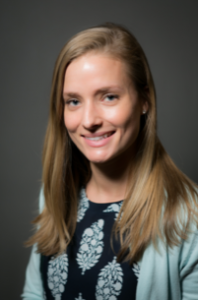Anna VerMeulen ’14 (’19 DPT) joined Mission Health in Asheville, North Carolina, as a physical therapist in October 2019; shortly after beginning her career, VerMeulen began work on a step-down unit treating patients who contracted the SARS-CoV-2 virus.

As a Doctor of Physical Therapy (DPT) student, the Gastonia, North Carolina, native wanted to pursue a career in acute care and work in intensive care. Prior to the COVID-19 pandemic, she worked in general medical units, orthopedics, or in other settings, while at Mission.
When the pandemic made its way to North Carolina in early March, VerMeulen credited open communication among leadership with determining how her role as a physical therapist might evolve.
“We had a pretty good understanding of what things would look like in the future to get everyone on the same page,” VerMeulen said. “When we had our first positive patients, we had a small group of therapists assigned to treat those patients.”
Since then, Mission began rotating physical and occupational therapists in and out of COVID-19 units; VerMeulen said she has served as the sole physical therapist on a step-down unit and has treated patients who are leaving the ICU or who did not require care from the ICU. The rotation of month-long shifts on the COVID-19 units also allow for an opportunity for therapists to take a break from the mental and physical demands brought on by the pandemic.
“It’s a reprieve for therapists,” VerMeulen explained. “It can be exhausting being in a room with an N95 face mask, a gown, a shield, and gloves while working with a patient knowing they have a condition that you could contract through the air. […] Everyone who works in the hospital is taking extra care, but it’s an extra level of anxiety.”
Despite this, VerMeulen said she still enjoyed her work with patients who have COVID-19.
“I really felt like I was making a difference, using all of my skills, and what I was trained to do,” VerMeulen said.
VerMeulen expects to complete her next shift in the COVID-19 step-down unit in October. She credited a clinical rotation, while still at student, at Mission’s pulmonary unit with giving her insight into the team and layout of the hospital before the pandemic began.
In the Division of Physical Therapy, in which the DPT program is housed, VerMeulen said an emphasis on interdisciplinary communication has allowed for her to succeed as a physical therapist during the global pandemic.
“I felt prepared with having those open and professional conversations with other medical professionals,” VerMeulen said. “That was definitely a big help of treating patients with COVID.”
VerMeulen said part of her role has included determining patients’ readiness for therapy to begin, what their plan of care might be, and if other health care providers might be able to manage therapeutic exercises with patients.
She said patients have varied in terms of functional levels; for some, physical therapy begins with sitting on the edge of their bed with supplemental oxygen. Others, VerMeulen described, might be able to walk around their room with no additional oxygen.
“The main thing we’re focused on is monitoring vitals and being overly cautious,” VerMeulen said. “All of these patients had a new virus that everyone was still learning about.”
VerMeulen said it is rewarding to speak with patients’ family members over the phone as they begin to discuss plans for discharge. “Throughout it all, these patients have been very motivated and were always willing to give their best,” she said. “It definitely felt like we were making a difference with these patients’ level of recovery and ability to return home and be with their families.”
The Division of Physical Therapy is housed in the UNC School of Medicine Department of Allied Health Sciences. In March 2020, U.S. News & World Report ranked the DPT program as #9 in the country.